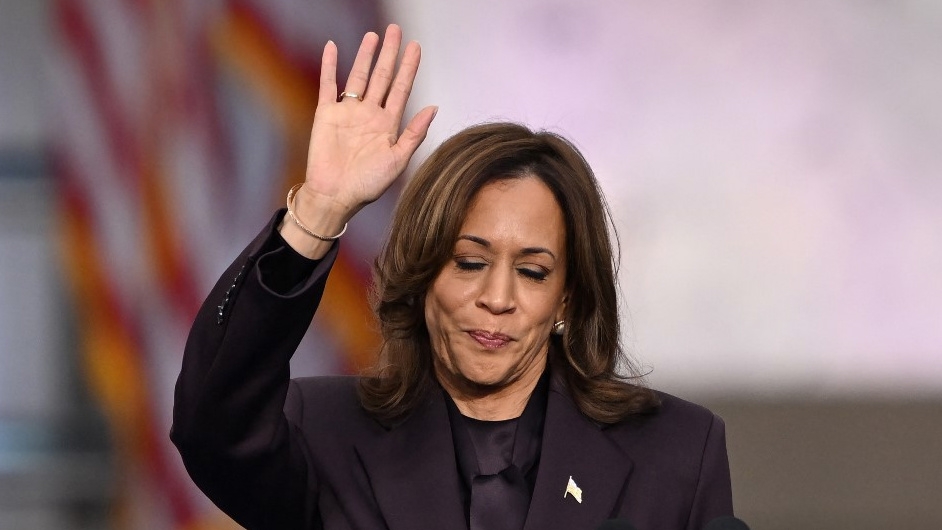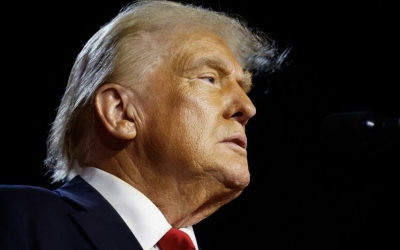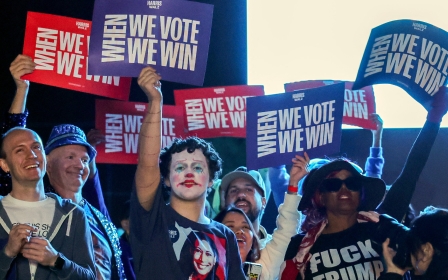Instead of looking inwards, white liberals are blaming Arab Americans for Trump's victory

As soon as early election results pointed to a clear victory for former President Donald Trump, liberals took to social media to criticise American Muslims, Arabs and Latinos for not fully supporting Vice President Kamala Harris.
Social media posts ranged from calls to deport Muslims and Latinos to wishing for Trump to unleash more destruction on Gaza.
This backlash tactlessly showed the dynamics of how white liberals view the role of minorities, especially Muslims and Arabs, in American politics. In a classic display of the white saviour complex, these communities were blamed for "not knowing what's best for them", as though Harris was running altruistically to protect them from the dangers of a second Trump presidency.
The fact that Harris' presidential campaign centred on countering Trumpism showed a lack of genuine interest in tackling issues important to minority groups.
Democrats actually benefitted from Trump's rise, which presented an opportunity for them to win votes freely by positioning themselves as the only alternative to outright fascism.
New MEE newsletter: Jerusalem Dispatch
Sign up to get the latest insights and analysis on Israel-Palestine, alongside Turkey Unpacked and other MEE newsletters
Yet, instead of looking inwards for answers on why Harris lost to a candidate as problematic as Trump, these liberal Democrats chose to reprimand minorities. Signalling a sense of superiority, they could not hide their racism, implying that it was incumbent upon these minority communities to vote within the guidelines provided by their liberal saviours.
By this logic, Arabs, Muslims and Latinos must vote for a Democrat no matter what. This viewpoint strips minority communities of their rights as equal citizens who can partake in the democratic process independently.
While the days of barring Black people and women from voting are behind us, this backlash brings to mind the same white supremacist logic: that non-whites are incapable of voting on their own and require guidance from their liberal saviours.
Arrogant disregard
In the months leading up to election day, Democrats ignored the cries of Muslims, Arabs and their allies to at least recognise the suffering of Palestinians in Gaza. They arrogantly disregarded warnings about potentially losing the Arab vote in Michigan due to Israel's war on Gaza despite desperately needing to win the swing state to have any hope of beating Trump.
To make matters worse, former President Bill Clinton was sent to Michigan to patronise the Arab community, justifying Israeli crimes in Gaza by saying Israel had to kill civilians in order to defend itself.
Follow Middle East Eye's live coverage of the Israel-Palestine war
This attitude towards voters in Michigan stemmed from a racist and orientalist notion that Arabs and Muslims would eventually fall in line, fearing Trump's presidency.
Blaming Arabs, Muslims and Latinos for Harris' humiliating defeat highlights the Democrats' sense of entitlement to the votes of these communities. The rage-filled, racist attacks on social media marked the resulting tantrum of these liberal saviours.
Ignoring the real issues that enabled Trump's victory, Democrats instead chose to blame those desperately trying to stop the ongoing mass murder of their loved ones in Gaza and Lebanon. Giving nothing in return, these Democrats wanted the grieving masses to forget about the US-enabled genocide overseas in order to defeat Trump domestically.
Is it even possible for Arabs and Muslims to be seen as equal citizens without compromising their social and political principles?
Both Republicans and Democrats view Israel as a strategic partner in maintaining American interests and hegemony in the Middle East. Opposing their unconditional US support for Israel is therefore portrayed as a betrayal of American national interests that cannot be tolerated in the political discourse.
Despite the lack of major Arab and Muslim endorsements for Harris, the Democratic Party did not entertain any demands of ending the Gaza genocide, asserting instead that the reward for helping Harris get elected would be to prevent another Trump presidency - thus placing the burden of "saving" democracy on to suffering communities.
The Uncommitted National Movement provided a golden opportunity for the Democratic establishment to acknowledge the grievances of Arabs and Muslims without requiring any policy concessions on Israel, especially given how naively loyal the movement proved to be.
But the compromises of the Uncommitted movement, which lowered its demands from an arms embargo on Israel to simply allowing a Palestinian-American speaker at the Democratic National Convention (DNC), were met with rude dismissals.
Calculated strategy
The Democratic Party's refusal to negotiate with the communities affected by the Gaza genocide was not an oversight. It was a calculated decision based on prioritising other potential voters, particularly white anti-Trump Republicans, as represented by Harris' decision to campaign alongside politician Liz Cheney.
If Democrats truly valued Arabs and Muslims, rather than seeing them as secured votes in the bag, they would have, at the very least, found a more empathic way to dismiss their protests instead of shouting over them, as Harris infamously did: "I'm speaking."
There is no doubt that the collective rage among liberals over losing the election to Trump comes from a place of cognitive dissonance influenced by American exceptionalism. How could the US - a beacon of liberal values and justice - elect a racist, misogynistic, xenophobic, convicted felon as its president?
Yet, rather than taking this opportunity to examine the many issues within American democracy and society - ranging from structural racism to economic inequality, monstrous foreign policies, and the malign influence of money and multinational corporations on politics - liberals are taking their frustrations out on disenfranchised communities.
Comments across social media following Trump's victory showcase a serious resentment towards Arab and Muslim causes, especially the genocide in Gaza, displaying how superficial liberals' past "support" for such causes actually was. Liberals are simply refusing to admit the Biden administration's role in losing the Arab and Muslim vote.
This fallout puts Arab and Muslim communities at a critical juncture in terms of how they see themselves in relation to the US as a state and as an empire. The Gaza genocide has brought back discussions about the role of the US in destroying Arab and Muslim nations and the ethical responsibility of holding it accountable for these crimes.
Ultimately, the racism, orientalism and feeling of expendability that minority communities are experiencing after this election challenge the assumption that they can be integrated and included within American society and its supposed democracy. Is it even possible for Arabs and Muslims to be seen as equal citizens without compromising their social and political principles?
The views expressed in this article belong to the author and do not necessarily reflect the editorial policy of Middle East Eye.
Middle East Eye delivers independent and unrivalled coverage and analysis of the Middle East, North Africa and beyond. To learn more about republishing this content and the associated fees, please fill out this form. More about MEE can be found here.






